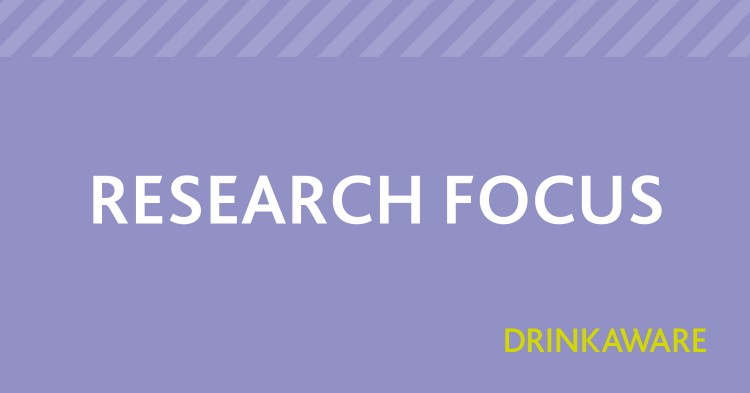To mark Alcohol Awareness Week, we facilitated our Winter 2021 Research Briefing and were delighted to have lined up two speakers that each delivered presentations focusing on promoting wellbeing through behaviour change.
Dr David Comerford, a Behavioural Economist and Senior Lecturer based at the University of Stirling firstly presented a paper entitled Promoting wellbeing and behaviour change using prompts. Dr Comerford provided two examples of interventions from his published and peer-reviewed research, focusing on breastfeeding and job choice. He considered the implications for behaviour and how a simple prompt may be effective at getting people to identify and choose what is in our best interest. Donal Kiernan, Addiction Counsellor at University College Dublin then gave a presentation in which he provided a personal insight into his experiences of being an advocate for young adults, building relationships with students and how they manage their relationships with alcohol.
The presentations were followed by a Q&A session that most certainly provided the attendees with plenty of room for thought, with several of the discussion points highlighted further here. For instance, David introduced the concept of self-efficacy in his research on using prompts to encourage breastfeeding. There are overlaps in the lessons learnt in his research and that of peoples’ drinking behaviour that warrant consideration and specifically, two aspects are important in bridging the intention-behaviour gap – information and time. For instance, the provision of information provides reassurance and prompts should also be timely, occurring before the event itself happens is possible.
A question was posed on what stops us from changing our behaviour and the significance of fear of success and/or fear of failure. David mentioned that from an Economist standpoint, he believed that people pursue whatever they view to be in their best interest and if the benefits are greater than the costs, you’ll see people engaging in that behaviour. However, he also recognised that there may be more depth and richness from other disciplines such as psychology. In turn, Donal spoke about the perceived reward of what we have in our hand, for instance, from a gamblers’ point of view, we value more what might be, rather than what we actually have. He proposed that culturally we can be afraid of success because it brings responsibility, change, uncertainty as well as a responsibility to others. Whereas with fear of failure, we applaud the great battle that we put up.
We have gathered some worrying evidence on young adults as part of our Barometer series on the impact of COVID-19 on their drinking behaviour and practices and some of the points that Donal made in his presentation stood out in terms of ensuring to work with young adults as opposed for working for them as well as the importance of non-judgemental collaboration. Normalising experiences for young adults is crucial in speaking and engaging with them and Donal provided an example of how he has done this in his work by adapting to the COVID-19 context by ‘walking and talking together’ outdoors.
David was asked about the importance of people not feeling alone in the experience of the intervention, and he noted that there is no doubt that we take our cues from what is appropriate of functional behaviour from observing around us. For instance, by giving people statistics on a majority of people do such and such or don’t is well known to alter people’s behaviour i.e. in hotel rooms, 80% of our clients will reuse towels. If you see that, maybe through guilt, you will reuse your towel. But equally what David has seen in the domain of alcohol use, simply giving people feedback as to whether their drinking is at the extreme end of the distribution, can be enough to ‘prompt’ them to recognise that they need to take action i.e. you drink more than 80% of people your age and gender. While not giving any new information on how much they drink, it lets them know they are an ‘outlier’ in terms of what’s normal behaviour and in turn providing information on a website linking to advise on drinking behaviour. There is certainly a lot of scopes to apply our sense of connectedness with other people as a means not only to give support as we go through processes of behavioural change but also to trigger that impetus to change our behaviour in the first instance. Herein lies the potential significance of our work in Drinkaware, by highlighting the percentage of those who are changing their habits to drinking or who would like to, prompts a positive conversation and potential to change themselves.
Donal told the audience of how he was promoting positive thinking and self-assertion initiatives on university campus, such as visual cues on television screens. This is crucial in behaviour change – if you don’t highlight that change is possible, then the self-efficacy piece kicks in and people go what’s the point? Certainly, when we talk about alcohol and change in Drinkaware, we speak about how there are a third of the population that want to change, there are a third of the population that are changing. It is really important to balance this with the negative aspects of peoples’ drinking behaviour, and so we look forward to continuing trying to achieve this in 2022.
We look forward to facilitating further debate on alcohol and behavioural change by hosting our next research briefing in Spring 2022 and in so doing, contribute to sharing learnings and knowledge. If you would like to be added to our invite list, please email research@drinkaware.ie. We also encourage you to look at the section dedicated to our Research Briefing Series on our website to which any outputs from this and all previous events are added and freely accessible.


